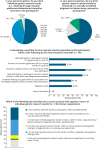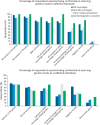Global Perspectives on Returning Genetic Research Results in Parkinson Disease
- PMID: 39807215
- PMCID: PMC11727605
- DOI: 10.1212/NXG.0000000000200213
Global Perspectives on Returning Genetic Research Results in Parkinson Disease
Abstract
Background and objectives: In the era of precision medicine, genetic test results have become increasingly relevant in the care of patients with Parkinson disease (PD). While large research consortia are performing widespread research genetic testing to accelerate discoveries, debate continues about whether, and to what extent, the results should be returned to patients. Ethically, it is imperative to keep participants informed, especially when findings are potentially actionable. However, research testing may not hold the same standards required from clinical diagnostic laboratories and hold significant psychosocial implications. The absence of universally recognized protocols complicates the establishment of appropriate guidelines.
Methods: Aiming to develop recommendations on return of research results (RoR) practice within the Global Parkinson's Genetics Program (GP2), we conducted a global survey to gain insight on GP2 members' perceptions, practice, readiness, and needs surrounding RoR.
Results: GP2 members (n = 191), representing 147 institutions and 60 countries across 6 continents, completed the survey. Access to clinical genetic testing services was significantly higher in high-income countries compared with low- and middle-income countries (96.6% vs 58.4%), where funding was predominantly covered by patients themselves. While 92.7% of the respondents agreed that genetic research results should be returned, levels of agreement were higher for clinically relevant results relating to pathogenic or likely pathogenic variants in genes known to cause PD or other neurodegenerative diseases. Less than 10% offered separate clinically accredited genetic testing before returning genetic research results. A total of 48.7% reported having a specific statement on RoR policy in their ethics consent form, while 53.9% collected data on participants' preferences on RoR prospectively. 24.1% had formal genetic counselling training. Notably, the comfort level in returning incidental genetic findings or returning results to unaffected individuals remains low.
Discussion: Given the differences in resources and training for RoR, as well as ethical and regulatory considerations, tailored approaches are required to ensure equitable access to RoR. Several identified strategies to enhance RoR practices include improving informed consent processes, increasing capacity for genetic counselling including providing counselling toolkits for common genetic variants, broadening access to sustainable clinically accredited testing, building logistical infrastructure for RoR processes, and continuing public and health care education efforts on the important role of genetics in PD.
Copyright © 2024 The Author(s). Published by Wolters Kluwer Health, Inc. on behalf of the American Academy of Neurology.
Conflict of interest statement
The authors report no relevant disclosures. Go to Neurology.org/NG for full disclosures.
Figures



References
LinkOut - more resources
Full Text Sources
Medical
